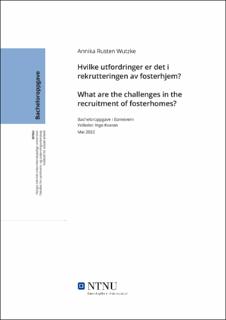| dc.contributor.advisor | Kvaran, Inge | |
| dc.contributor.author | Wutzke, Annika | |
| dc.date.accessioned | 2022-07-06T17:22:23Z | |
| dc.date.available | 2022-07-06T17:22:23Z | |
| dc.date.issued | 2022 | |
| dc.identifier | no.ntnu:inspera:111257804:48526431 | |
| dc.identifier.uri | https://hdl.handle.net/11250/3003330 | |
| dc.description.abstract | Tema for denne oppgaven er fosterhjemsordningen i Norge i dag. Fokuset for oppgaven er den største gjeldende utfordringen innenfor fosterhjemsordningen som er mangelen på fosterhjem. Mangelen på fosterhjem har vært en utfordring for norsk barnevern over flere år, men på tross av dette synes det ikke en merkbar bedring. Derfor vil denne oppgaven se nærmere på på hva som er grunnene til denne mangelen.
Teori om motivasjon og behov står sentralt i denne oppgaven. Slik som fosterhjemsordningen er i dag, er hovedparten av fosterforeldrene individer som melder seg til å ta på seg et frivillig oppdrag som de kan si opp når de måtte ønske det. Nøkkelordet er frivillighet, og det vil derfor rettes oppmerksomhet mot hva som er fosterforeldres motivasjon for å ta på seg oppdraget.
På systemnivå er ansvaret for fosterhjemsordningen delt mellom stat og kommune. Endringer i denne ansvarsfordelingen og øvrige politiske prioriteringer får konsekvenser for praksis. Denne oppgaven konsentrerer seg om spesifikt to politiske prioriteringer som har hatt konsekvenser for fosterhjemsordningen. En av disse er den politiske prioriteringen av det biologiske prinsipp. Den andre er den politiske prioriteringen av fosterhjem og dreiningen vekk fra institusjon. Konsekvensene av dette er med å sette spørsmålstegn ved om formålet med fosterhjemsplasseringene blir oppfylt i dag, og om de vil bli det i neste årene.
Drøftingsdelen av oppgaven vil drøfte spørsmålene hvorfor vi ikke klarer å rekruttere nok fosterhjem, hva som kan gjøre fosterhjemsoppdraget mer attraktivt og hvorvidt det er en mismatch mellom dagens utvikling og fosterforeldres motivasjon. | |
| dc.description.abstract | Abstract
The theme for this thesis is the current fosterhome arrangement in Norway. The lack of fosterhomes is the biggest challenge within the foster home arrangement today. The Norwegian child welfare has had this challenge for several years, but despite this there does not seem to be a noticeable improvement. Therefore, this thesis will take a closer look at what reasons lie behind this deficiency.
Motivational theory and theory of needs are central to this thesis. The current foster home arrangement is based on voluntariness. The majority of foster parents are individuals that have signed up to do this besides work as an voluntary agreement which they can terminate when they wish. This voluntariness depends therefore largely on the fosterparents' innate motivation to take on the task.
Systemically, the responsibility for the foster home arrangement is divided between the state and the municipality. Changes in this division of responsibilities and other political priorities have consequences for practice. This thesis concentrates on specifically two political priorities that have had consequences for the foster home arrangement. One of these is the political prioritization of the biological principle. The second is the political prioritization of foster homes and the shift away from child welfare institution, also called group homes. The consequences of this prioritization leads to the question whether the purpose of the foster care placements is fulfilled today, and whether they will be so in the coming years.
The discussion part of the thesis will discuss the questions of why we are not able to recruit enough foster homes, what can make the foster home assignment more attractive and whether there is a mismatch between the current development and what the foster parents' motivation for taking on the foster parent mission is. | |
| dc.language | nob | |
| dc.publisher | NTNU | |
| dc.title | Hvilke utfordringer er det i rekrutteringen av fosterhjem? | |
| dc.type | Bachelor thesis | |
